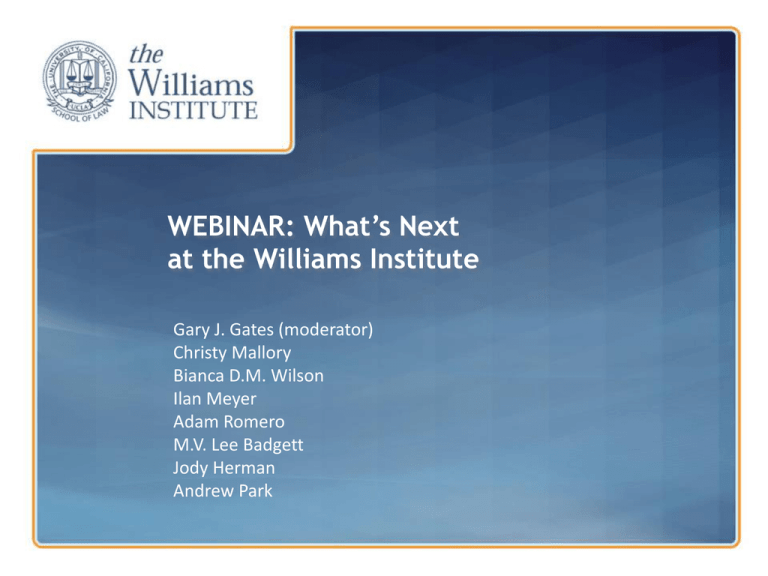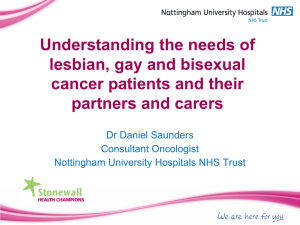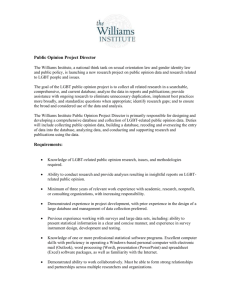
WEBINAR: What’s Next
at the Williams Institute
Gary J. Gates (moderator)
Christy Mallory
Bianca D.M. Wilson
Ilan Meyer
Adam Romero
M.V. Lee Badgett
Jody Herman
Andrew Park
Introduction
Gary J. Gates
Blachford-Cooper Distinguished
Scholar and Research Director
State Non-discrimination
Laws and their
Economic Impact
Christy Mallory
Senior Counsel and
Anna M. Curren Fellow
State-Level Employment Discrimination Reports
Analysis of Administrative Complaints Filed with
State Enforcement Agencies
Average
California
Colorado
4.9
3.7
4.6
4.2
9.6
10.5
Connecticut
5.4
6.3
DC
5.1
5.5
5.1
Hawai'i
1.2
3.9
3.0
Illinois
4.4
3.5
4.5
Maryland
1.5
1.1
2.2
Minnesota
2.4
0.8
1.6
New Hampshire
4.6
3.1
5.4
Oregon
6.1
6.2
3.7
Washington
Wisconsin
Race
10.1
4.9
4.6
3.7
2.3
2.5
3.6
New York
Rhode Island
National Population-Adjusted Employment
Complaint Rates (per 10,000 workers)
2.2
2.3
4.7
Race
4.1
2.9
4.7
1.5
1.1
1.9
4.4
7.5
Sex
19.0
SOGI
Sexual Orientation
and Gender Identity
Sex
Next:
Analyses of housing and public accommodations
complaints
Economic Impact of Discrimination
Employment Discrimination and Housing
Discrimination against Trans Residents of
New York (NTDS)
Cost to NY =
$1.5M-$7M annually
Next:
New research on costs associated with negative health outcomes
related to discrimination
LGBTQ Youth
Bianca D.M. Wilson
Rabbi Barbara Zacky Senior
Scholar of Public Policy
Domains of LGBT Youth Work
• Youth and state institutions
– Child welfare
– Juvenile custody/incarceration
– Schools
• Economic Instabilities
– Homelessness
– Sex work
• Health
– Reproductive/sexual health
– Mental health and minority stress
– Access to services
Cross Cutting Themes:
Intersectionality
Community-grounded
public policy research
Explaining how SOGIE
matters in creating
disparities
Current Projects
We now know that...
• 19% of foster youth are LGBTQ
(Wilson et al, 2014)
• Moved around more placements
• More likely to live in a group home
• Experienced homelessness at higher rate
Want to assess further…
• How is gender related to foster care disparities?
– Transgender vs non-trans
– Genderconforming vs non genderconforming
– Cisgender girls vs cis-boys
Other next steps…
1.
2.
3.
4.
More population-base data needed
Risk and protective factors
Barriers to service
Documenting and evaluating service programs
New project to
study stress and
health of three
generations of LGB
people
generations-study.com
Ilan Meyer
Williams Distinguished Senior
Scholar of Public Policy
Health Disparities:
LGBT vs. heterosexual cisgender people
1. Pride – Coming out
– 1969 – Stonewall, 1970 – First gay pride march
– 1973 APA removes homosexuality from DSM
– US Civil Service Commission stops ban on hiring
homosexuals by Federal government
2. Integrations – Visibility, Strengthening Structures
– 1982 PFLAG, GMHC founded
– 1984 West Hollywood founded as city with majority
openly gay people in council; Project 10 in Los
Angeles,
– 1985 Harvey Milk school in NY,
– 1987 ACT UP, National Coming Out Day
– 1988 First gay and lesbian studies (City College of
SF)
3. Equality
– 1994 Internet widely used
– 1997 Ellen Degeneres comes out
– 1998 Matthew Shepard murdered, first GSA
– 2000 Vermont legalizes same-sex partnerships
– 2003 Massachusetts Supreme Court
unconstitutional to deny marriage to same sex
couples
1. Are there differences in the minority stress
experience of these different generations of LGB
people? For example, are there there newer
more subtle and hidden forms of homophobia
2. What impact, if any, do they have on health?
3. Are there differences in the type and extent of
health problems related to these stressors?
Research questions
The new gay identity and community:
1. Is there a new LGBT identity? Does it have global
meaning and significance?
2. Is there a continued role for an LGBT community as a
reasonable vehicle for delivering information,
services, and political action?
• Explores identity, stress, health outcomes, and health care and
services utilization among LGBs in 3 generations of adults, now
ages 18 – 25, 34 – 41, 52 – 59.
• Assess how changes in the social environment affect the
experience and health of LGB people across the lifespan.
• Mixed methods
– Quantitative longitudinal survey using a representative
(probability) sample of Black, Latino, and White LGB people
in the U.S. follow up for 5 years.
– Qualitative life history interviews with Asian, Black, Latino,
and White LGB people in urban and non-urban areas in
California, New York, and Arizona
Criminal Justice
Adam P. Romero
Senior Counsel and
Arnold D. Kassoy Scholar of Law
Recent Criminal Justice Publications
•
Mallory et al., Discrimination and Harassment by Law Enforcement Officers in the
LGBT Community (2015), http://williamsinstitute.law.ucla.edu/research/violencecrime/discrimination-and-harassment-by-law-enforcement-officers-in-the-lgbtcommunity/
•
Hasenbush et al., HIV Criminalization in California: Penal Implications for People
Living with HIV/AIDS (2015), http://williamsinstitute.law.ucla.edu/research/healthand-hiv-aids/hiv-criminalization-in-california-penal-implications-for-people-livingwith-hivaids/
•
Mallory et al., LGBTQ Youth Face Unique Barriers to Accessing Youth Mentoring
Programs (2014), http://williamsinstitute.law.ucla.edu/research/safe-schools-andyouth/barriers-to-accessing-lgbtq-youth-mentoring-programs/
•
Sears et al., Discrimination Against Law Enforcement Officers on the Basis of Sexual
Orientation and Gender Identity: 2000-2013 (2013),
http://williamsinstitute.law.ucla.edu/research/workplace/law-enforcement-discrim2000-13/
Ongoing Criminal Justice Projects
•
Providing legal research to the Department of Justice of its authority to prohibit sexual
orientation and gender identity discrimination in criminal justice-related grant programs
•
Conducting groundbreaking research on LGBT people in prisons and jails, including their
prevalence, demographics, and sexual victimization
•
Supporting the Bureau of Justice Statistics in adding sexual orientation and gender
identity measures to the National Crime Victimization Survey, the Police Public Contact
Survey, and other federal surveys
•
Exploring new ways to collect data on LGBT people in the criminal justice system
•
Providing research and testimony to legislatures considering banning the “LGBT panic”
defense
•
Helping develop prosecutorial guidelines for HIV-related criminal laws
•
Providing research to support the REPEAL Act
•
Developing a robust research agenda related to criminal justice
LGBT Poverty
M.V. Lee Badgett
Williams Distinguished Scholar
Understanding LGBT Poverty
What do we mean by poverty?
• Official federal poverty threshold
• Purely based on family income
One person under 65
Not poor
--$12,316-Poor
Two adults, two kids
Not poor
--$24,008-Poor
Percent of poor couples, 2012
9
8
7
6
5
4
3
2
1
0
7.9
5.8
3.3
Different-Sex
Married
Same-Sex Male
Same-Sex Female
Source: American Community Survey
Extra-vulnerable groups
• Same-sex couples with children
– Biggest gap for African-American children and those
living with female same-sex couples
• African Americans in same-sex couples
• Women in same-sex couples
– Especially outside of metro areas
• Transgender people—not included in data
Self-identified LGB 18-44 years
2006-2010
27.8
30.0
22.6
25.0
21.1
20.0
15.0
15.3
10.0
5.0
0.0
Heterosexual
Gay/Lesbian/Bisexual
Heterosexual
Men
Gay/Lesbian/Bisexual
Women
2006-2010
2006-2010 National Survey of Family Growth
Single LGBT people living alone
25
20.1
20
15
21.5
19.1
13.4
10
5
0
Heterosexual
men
GBT men
Heterosexual LGBT women
women
Gallup Daily Tracking Poll, 2012
NHIS 2013-14 poverty rates by sexual
orientation
30%
18%
19%
18%
14%
Women
Heterosexual
12%
Men
Les/gay
Bisexual
Impact on poverty from increasing minimum
wage to $10.10
14.5
10.1
7.9
5.9
5.8
4.4
Married Different Sex
3.3
Unmarried Different-Sex
2.3
Male Same-Sex
Female Same-Sex
Reduce gender wage gap
16.0
14.5
14.0
11.8
12.0
10.0
7.9
8.0
6.0
5.8
5.4
5.0
4.0
2.0
0.0
Different-Sex Married
Actual Poverty Rate
Different-Sex Unmarried
Same-Sex Female
Estimated Poverty Rate with Gender Wage Equality
Compounding sources of economic insecurity
for LGBT people
Loss of
job, low
income
Health
disparities
Access to
services?
POVERTY
Gender Identity
Measurement and
Transgender
Health Research
Jody Herman
Scholar of Public Policy
Data Collection:
Why is it important?
• Data from federal surveys inform public policies
that impact health and well-being
• Very few federal surveys collect data to identify
transgender people
• Two Williams Institute projects advance GI data
collection and trans health research:
o California Health Interview Survey
o TransPop: U.S. Transgender Population Health
Survey
California Health
Interview Survey
Large Health Survey (~40K adults & ~8k youth)
Two-year cycles (2015-2016)
Demographics & Health indicators/outcomes
Sexual Orientation Measure (since 2001)
Gender Identity Measures
o Pilot Testing (Fall 2014)
o Selected two-step measure based on pilot
o Included in 2015-2016 cycle
• www.healthpolicy.ucla.edu/chis
•
•
•
•
•
“TransPop” Project
The study is supported by the National Institute of Health, Office of Social
and Behavioral Science and the Eunice Kennedy Shriver National Institute of
Child Health and Human Development (R01HD078526).
www.transpop.org
“TransPop” Project, cont’d
• Gallup Daily Tracking Poll
• Very large sample (~350,000 annually)
• Identify sample of transgender-identified adults to
enroll in TransPop
• Demographics, Experiences, Health indicators and
outcomes
• Nationally-representative sample
o First of its kind
o Can be used to adjust non-representative samples
International
Programs
Andrew Park
Director of International
Programs
International Development
Economic Cost of Stigma
Including SO/GI on Census
Evaluating public opinion amongst
Muslim communities
Including SO on Census
Best practices in surveys of gender
identity
Contact us
Email
williamsinstitute@law.ucla.edu
Website
williamsinstitute.law.ucla.edu
Twitter
@williamspolicy
Facebook
facebook.com/williamsinstitute
Gary J. Gates
gates@law.ucla.edu
Adam Romero
romero@law.ucla.edu
Christy Mallory
mallory@law.ucla.edu
M.V. Lee Badgett
badgett@law.ucla.edu
Bianca DM Wilson
wilsonb@law.ucla.edu
Jody Herman
hermanj@law.ucla.edu
Ilan Meyer
meyer@law.ucla.edu
Andrew Park
parka@law.ucla.edu



